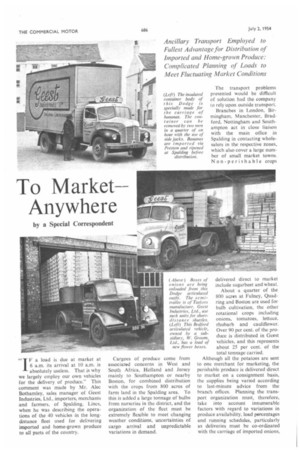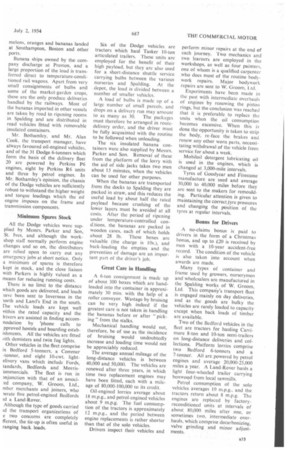To Market- Anywhere
Page 72

Page 79

If you've noticed an error in this article please click here to report it so we can fix it.
by a Special Correspondent
I " F a load is due at market at 6 a.m. its arrival at 10 a.m. is absolutely useless. That is why we largely employ our own vehicles for the delivery of produce." This comment was made by Mr. Alec Bothamley, sales manager of Geest Industries, Ltd., importers, merchants and farmers, of Spalding, Lines, when he was describing the operations of the 40 vehicles in the longdistance fleet used for delivering imported and home-grown produce to all parts of the country. Cargoes of produce come from associated concerns in West and South Africa, Holland and Jersey mainly to Southampton or nearby Boston, for combined distribution with the crops from 800 acres of farm land in the Spalding area. To this is added a large tonnage of bulbs from nurseries in the district, and the organization• of the fleet must be extremely flexible to meet changing weather conditions, uncertainties of cargo arrival and unpredictable variations in demand. The transport problems presented would be difficult of solution had the company to rely upon outside transport.
Branches in London, Birmingham, Manchester, Bradford, Nottingham and Southampton act in close liaison with the main office in Spalding in contacting wholesalers in the respective zones, which also cover a large number of small market towns. Non-perishable crops delivered direct to market include sugarbeet and wheat.
About a quarter of the 800 acres at Fulney, Quadring and Boston are used for bulb cultivation, the other rotational crops including onions, tomatoes, lettuce, rhubarb and cauliflower. Over 90 per cent. of the produce is distributed in Geest vehicles, and this represents about 25 per cent. of the total tonnage carried.
Although all the potatoes are sent to one merchant for marketing, the perishable produce is delivered direct to market on a consignment basis, the supplies being varied according to last-minute advice from the branch offices. Planning the transport organization must, therefore, take into account innumerable factors with regard to variations in produce availability, load percentages and running schedules, particularly as deliveries must be co-ordinated with the carriage of imported onions, melons, oranges and bananas landed at Southampton, Boston and other ports.
Banana ships owned by the company discharge at Preston, and a large proportion of the load is transferred direct to temperature-conditioned rail wagons. Apart from very small consignments of bulbs and some of the market-garden crops, these are the only produce deliveries handled by the railways. Most of the bananas imported in other vessels are taken by road to ripening rooms in Spalding and are distributed in road vehicles fitted with removable insulated containers.
Mr. Bothamley, and Mr. Alan Cook, the transport manager, have always favoured oil-engined vehicles, and of the 31 Dodge 6-tonners which form the basis of the delivery fleet 20 are powered by Perkins P6 engines, eight by Perkins R6 units and three by petrol engines. In Mr. Bothamley's opinion, the chassis of the Dodge vehicles are sufficiently robust to withstand the higher weight and torque loadings which the oil engine imposes on the frame and transmission components.
Minimum Spares Stock
All the Dodge vehicles were sup plied by Messrs. Parker and Son, St. Ives, and although the work shop staff normally perform engine changes and so on, the distributors are relied upon to carry out any emergency jobs at short notice, Only a minimum of spares is therefore kept in stock, and the close liaison with Parkers is highly valued as a means for reducing running costs. There is no limit to the distance
which goods are delivered, and loads lave been sent to Inverness in the iorth and Land's End in the south. the vehicle loads are kept well vithin the rated capacity and the Myers are assisted in finding accomnodation by 'phone calls to .pproved hostels and boarding estabishments. All the vehicles are fitted iith demisters and twin fog lights. Other vehicles in the fleet comprise ix Bedford 5-tonners, a Commer -tonner, and eight 10-cwt. lightelivery vans which include Fords, tandards, Bedfords and Morris'ommercials. The fleet is run in mjunction with that of an associ-ed company, W. Groom, Ltd., mber merchants and joiners, who )erate five petrol-engined Bedfords td a Land-Rover.
Although the type of goods carried id the transport organizations of e two concerns are completely fferent, the tie-up is often useful in ranging back loads.
Six of the Dodge vehicles are tractors which haul Tasker 10-ton articulated trailers. These units are employed for the benefit of their high payload, but they arc also used for a short-distance shuttle service carrying bulbs between the various nurseries and Spalding. At the depot, the load is divided between a number of smaller vehicles.
A load of bulbs is made up of a large number of small parcels. and drops on a delivery run may amount to as many as 30. The packages must therefore be arranged in routedelivery order, and the driver must be fully acquainted with the routine to be followed when unloading.
The six insulated banana containers were also supplied by Messrs. Parker and Son. Removal of these from the platform of the lorry with the aid of side jacks takes two men about 15 minutes, when the vehicles can be used for other purposes.
When the bananas are transported from the docks to Spalding they are packed in straw, and this reduces the useful load by about half the rated payload because crushing of the tower layers must be avoided at all costs. After the period of ripening under temperature-controlled cond:tions, the bananas are packed in wooden cases, each of which holds about 28 lb. These boxes are valuable (the charge is 10s.), and back-loading the empties and the prevention of damage are an important part of the driver's job.
Great Care in Handling
A 6-ton consignment is made up of about 300 boxes which are handloaded into the container in approximately 30 min. with the help of a roller conveyor. Wastage by bruising can be very high indeed if the greatest care is not taken in handling the bananas before or after " picking" from the stalks.
Mechanical handling would not, therefore, be of use as the incidence of bruising would undoubtedly increase and loading time would not be appreciably reduced.
The average annual mileage of the long-distance vehicles is between 40,000 and 50,000. The vehicles are renewed after three years, in which time two replacement engines may have been fitted, each with a mileage of 80,000-100,000 to its credit.
Oil-engined lorries average about 18 m.p.g., and petrol-engined vehicles about 9 m.p.g. The fuel consumption of the tractors is approximately 12 m.p.g., and the period between engine replacements is rather shorter than that of the solo vehicles.
Drivers inspect their vehicles and perform minor repairs at the end of each journey. Two mechanics and two learners are employed in the workshops, as well as four painters, one of whom is a qualified carpenter who does most of the routine bodywork repairs. Major bodywork repairs are sent to W. Groom, 1,td.
Experiments have been made in the past with intermediate overhauls of engines by renewing the piston rings, but the conclusion was reached that it is preferable to replace the units when the oil consumption becomes excessive. When this is done the opportunity is taken to strip the body, re-face the brakes and renew any other worn parts, necessitating withdrawal of the vehicle from service for about a week.
Mobiloil detergent lubricating oil is used in the engines, which is changed at 3,000-mile intervals.
Tyres of Goodyear and Firestone manufacture are used and average 30,000 to 40,000 miles before they are sent to the makers for remoulding. Particular attention is given to maintaining the correct .tyre pressures and changing the position of the tyres at regular intervals.
Bonus for Drivers
A no-claims bonus is paid to drivers in the form of a Christmas bonus, and up to £20 is received by men with a 10-year accident-free record. The condition of the vehicle is also taken into account when awards are made.
Many types of container and frame used by growers, nurserymen and wholesalers are manufactured in the Spalding works of W. Groom, Ltd. This company's transport fleet is engaged mainly on day deliveries. and as the goods are bulky the vehicles are rarely loaded to capacity except when back loads of timber are available.
Two of the Bedford vehicles in the fleet are tractors for hauling Cardmore 8-ton and 10-ton semi-trailers on long-distance deliveries and collections. Platform lorries comprise two Bedford 6-tonners and a 7-tonner. All are powered by petrol engines and average 20,000-25,000 miles a year. A Land-Rover hauls a light four-wheeled trailer carrying boxwond from local sawmills.
Petrol consumption of the solo vehicles averages 10 m.p.g., and the tractors return about 8 m.p.g. The engines are replaced by factoryreconditioned units at intervals of about 80,000 miles after one, or sometimes two, intermediate overhauls, which comprise decarbonizing, valve grinding and minor adjustments.








































































































































